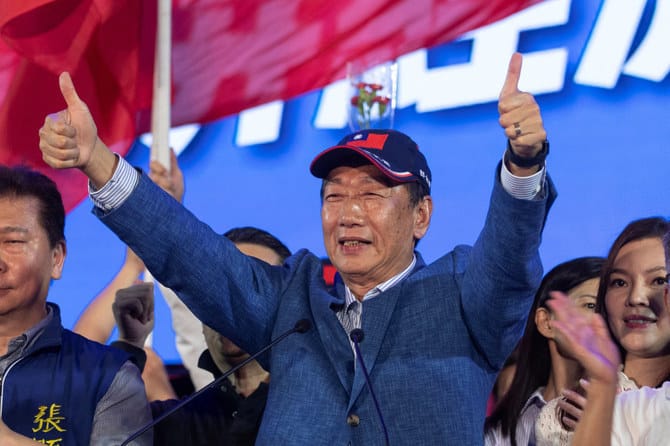Taiwan’s Presidential Election 2024: Taiwanese Trump enters the race

By Carlotta Busetto, BA Chinese
Taiwan’s next presidential election could not be coming at a more sensitive time in Cross-Strait relations. Any general election held on the Island always brings uncertainty in terms of regional stability – but this one is different.
On the 13th of January 2024, people will decide who is to replace the current president Tsai Ying-wen. Their decision could lead to turbulent weeks of unprecedented military pressure from the superpower neighbour, China. A likely scenario may be one similar to what was seen last September, which saw the highest level of military exercises, including dozens of warships, fighter jets and drones. China views Taiwan as a rightful part of its own territory – a claim the Island rejects. Although President Xi Jinping has promised reunification, by force if necessary by 2027, relations between Taiwan and the USA have nevertheless strengthened at an unprecedented level.
Last year, former Speaker of the House of Representatives, Nancy Pelosi, shook the status quo with her historic visit to the Island. To make things more problematic, Vice President William Lai, the current favoured candidate in the upcoming election as reported by My Formosa Poll, paid a visit to the USA earlier this August on his way to Paraguay.
In this scenario, the current candidates officially consist of: Vice President Lai of the Democratic Progressive Party (DPP), New Taipei Mayor Hou Yu-ih of the Kuomintang (KMT), Ko Wen-je of the Taiwan People’s Party (TPP) and Independent Terry Gou. Currently, according to My Formosa Poll, polls indicate a lead held by Lai (DPP) of 36.7%. He is then followed by Ko (TPP) with 19.4% and Hou (KMT) with 17.7%. Lastly, Gou’s approval rating stands at 6.2%.
Terry Gou, the founder of Foxconn (the world’s largest manufacturer of iPhones) – also known as the Taiwanese Trump – announced his candidacy earlier this August. Like many of his billionaire counterparts, Gou has no experience in politics to date. After failing to win a nomination from the KMT, he is currently the only independent candidate in the race.
“Gou, the richest man in Taiwan, launched himself on the political stage as ‘an alternative to war’.”
Gou, the richest man in Taiwan, launched himself on the political stage as ‘an alternative to war’. His rhetoric blames the DPP and President Tsai for bringing the Island to the brink of war with its neighbour and promises to not ‘turn Taiwan into the next Ukraine’ if elected. He argues that the only current solution to peace is the strengthening of economic ties with China.
Unlike the DPP – the only party with a political agenda leaning toward Taiwanese independence – Gou’s understanding of Cross-Strait relations is influenced by his own background in business. Although Foxconn’s headquarters are based in Taiwan, most manufacturing occurs in China. In fact, some concerns over his candidacy arose from the influence China could have on Taiwanese policymakers if he’s elected president – a possibility Gou refuses.
His approach to politics has proven rather unconventional in recent weeks. To secure signatures to officiate his independent candidacy, he set up a scheme by which for every 100,000 signatures obtained he would donate NT $10 million (approximately £250,000) to his own charity Father Gou’s Hope Foundation. If elected president, one of his proposed solutions to Taiwan’s falling birthrate – one of the lowest in the world – would be for the government to give couples a pet per child born. Gou’s proposal comes in light of pet adoption rates rising exponentially with the potential of surpassing the current birth rate.
Although Gou’s prospects of winning the race seem unlikely as of now, his presence is nevertheless pivotal in Cross-Strait relations. His candidacy is very much favoured by China and other Taiwanese businessmen who operate across the Strait, but his promises of peace are not guaranteed. Last month, in honour of the anniversary of the Chinese People’s Liberation Army, a documentary titled Chasing Dreams was released where soldiers are seen professing their loyalty by stating their willingness to die for their country in the event of an invasion of Taiwan.
His candidacy constitutes yet another pro-China alternative, which seems largely unpopular among voters. The low trend in his approval rating only strengthens the DPP’s chances of securing another 4-year term. At the same time, his candidacy has left the KMT with a fragmented electorate, lessening the chances for the conservative party to win. It comes as no surprise that a figure like Terry Gou appeared in the Taiwanese political scene as the trend of tycoons entering elections started in America in 2016.
Photo Caption: Terry Gou at a campaign rally in Kaohsiung, Taiwan [Credit: Jameson Wu, ASP Getty Images)]



